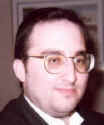|

|
D'var
Torah
by Rabbi Jay Spero |
Ephraim
& Menashe
Parshas
Vayechi
Contact Rabbi
Spero at 862-9546 or jsohr1@juno.com
If you are interested in receiving
Rabbi Spero's Dvar Torah in your email each week, please contact him at jsohr1@juno.com.
This portion, the last in the Book of Bereshis, closes out the story of Yaakov
and his children. Yaakov, realizing it is near the time of his death, wishes to
bless his children. Before he does this, though, he calls over Yoseph and his
two sons, Ephraim and Menashe, and gives them a special blessing. This blessing
is so special that for all future generations, when parents bless their sons, it
will be done using the names of Ephraim and Menashe: "By you shall Israel
bless" (Bereshis 48:20). (Girls are blessed using the names of the 4
mothers: Sorah, Rivka, Rachel and Leah.)
What was so special about Ephraim and Menashe, that for all future generations,
boys would be blessed to aspire to be like them?
Yaakov, after having wrestled the Angel of Esav, merited the name of Yisroel
(Israel). Thus began the period of nationhood of the people of Israel (as
opposed to the period of the three fathers and four mothers, which constituted a
phase of individuals). The nation began with the children of Yaakov, who all
grew up by his side, with the exception of Yoseph. Yoseph, through a series of
events which can only be labeled as Divine Providence, was sold as a slave and
eventually rose to power as Prime Minister in Egypt. He was the first person in
the nation of Israel to rear his children in a foreign land.
To rear children anywhere is a difficult task, but particularly in a country as
morally corrupt as Egypt. Nonetheless, Yoseph ensured that his sons were reared
in the paths of his parents, grandparents and great-grandparents. This great act
of rearing children properly in such adverse conditions would not only imbue
future generations of Jews with the spiritual DNA to resist assimilation, but
would also be a lesson of how to go about doing so.
Yoseph understood that as a descendant of the three fathers and four mothers,
and by virtue of his own relationship with G-d, he had a certain responsibility
to rear his children in a G-dly manner. Although his children spoke Egyptian (as
evidenced by the fact that they served as interpreters between Yoseph and his
brothers), Yoseph ensured that they were proficient not only in Hebrew, but also
in the study of Torah (as evidenced by the fact that they were immediately able
to assimilate with their cousins, uncles, and grandfathers once they arrived).
Thus we see the premium which Yoseph placed on his children having the same type
of education he had, although in different, even hostile, surroundings.
This is a lesson to all ages in all time periods. Ephraim and Menashe are an
example for all time.
Rabbi
Jay Spero is the rabbi of the Saranac
Synagogue in Buffalo.
|
